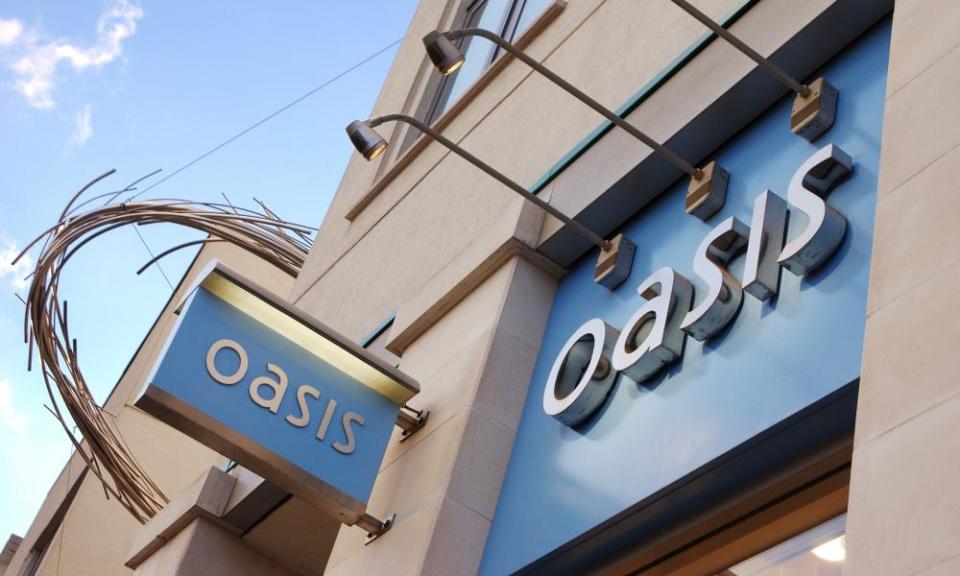Oasis and Warehouse fall into administration with loss of 200 jobs

Oasis and Warehouse have collapsed into administration with the immediate loss of 200 jobs and more than 1,800 at risk, as the fashion chains become the latest retailers to be hit by the coronavirus crisis.
Oasis and Warehouse Limited, a company that also includes The Idle Man and Bastyan Fashion, has appointed administrators from the advisory firm Deloitte.
A spokesperson said 1,800 of the store group’s employees would be furloughed under the government’s job retention scheme and 41 head office staff kept on during the attempt to salvage the business.
Income subsidies
Direct cash grants for self-employed people, worth 80% of average profits, up to £2,500 a month. There are similar wage subsidies for employees.
Loan guarantees for business
Government to back £330bn of loans to support businesses through a Bank of England scheme for big firms. There are loans of up to £5m with no interest for six months for smaller companies.
Business rates
Taxes levied on commercial premises will be abolished this year for all retailers, leisure outlets and hospitality sector firms.
Cash grants
Britain’s smallest 700,000 businesses eligible for cash grants of £10,000. Small retailers, leisure and hospitality firms can get bigger grants of £25,000.
Benefits
Government to increase value of universal credit and tax credits by £1,000 a year, as well as widening eligibility for these benefits.
Sick pay
Statutory sick pay to be made available from day one, rather than day four, of absence from work, although ministers have been criticised for not increasing the level of sick pay above £94.25 a week. Small firms can claim for state refunds on sick pay bills.
Other
Local authorities to get a £500m hardship fund to provide people with council tax payment relief.
Mortgage and rental holidays available for up to three months.
Until the coronavirus lockdown, the group operated 92 standalone stores and more than 400 concessions in department stores including Debenhams, Sainsbury’s and House of Fraser. The group’s main brands will continue to trade online while administrators assess options for the future of the business.
Rob Harding, a joint administrator at Deloitte, said: “Covid-19 has had a devastating impact on the entire retail industry, and not least the Oasis Warehouse group.
“Despite management’s best efforts over recent weeks, and significant interest from potential buyers, it has not been possible to save the business in its current form. Therefore it has been placed into administration.”
The government-imposed shutdown of the high street last month has already led to the administration of weak retailers including Debenhams and Cath Kidston. Others are expected to follow.
The footwear chain, Office, is also under pressure. Its South African owner, Truworths International, has hired advisers to find a buyer. It seeks a quick deal, which may also involve an administration process.
The fashion business’s problems emerged alongside new figures which indicated that retail sales across the UK slumped by more than a quarter in the first two weeks of the UK’s high street lockdown as food stockpiling and a surge in online orders failed to offset the loss of trade in non-essential stores.
The British Retail Consortium said the sales decline was the worst on record.
Helen Dickinson, the chief executive of the BRC, said sales of fashion and shoes had taken a significant hit while sales of computers and accessories, board games and fitness equipment all rose sharply as a result of the move to home schooling and working from home.
The high street closures fuelled a near-20% rise in online non-food sales in March, taking internet sales to an unprecedented 43.5% of the retail market, up from less than 30% in 2019.
Separately, Barclaycard reported an 18% jump in digital and content subscriptions, such as Netflix and Now TV, at the end of March. There was also a 17% rise in spending on home improvement and DIY.

 Yahoo Finance
Yahoo Finance 